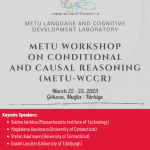Each year the UConn Logic Group chooses invites a distinguished “scholar of consequence” to deliver our Annual Logic Lecture. This year’s speaker is Maria Aloni (ILLC, University of Amsterdam). Her lecture will take place this Friday, March 31, 11am-1pm in ITE 336. This is an in-person event, but a zoom option will be available for those who cannot come (zoom link to be shared by email).
Nothing is Logical
People often reason contrary to the prescriptions of classical logic. In the talk I will discuss some cases of divergence between everyday and logical-mathematical reasoning and propose that they are a consequence of a tendency in human cognition to neglect models which verify sentences by virtue of an empty configuration [neglect-zero tendency, Aloni 2022]. I will then introduce a bilateral state-based modal logic (BSML) which formally represents the neglect-zero tendency and can be used to rigorously study its impact on reasoning and interpretation. After discussing some of the applications, I will compare BSML with related systems (truthmaker semantics, possibility semantics, and inquisitive semantics) via translations into Modal Information Logic [van Benthem 2019].
Maria Aloni. Logic and conversation: The case of free choice, Semantics and Pragmatics, vol 15 (2022)
Johan van Benthem. Implicit and Explicit Stances in Logic, Journal of Philosophical Logic, vol 48, pages 571–601 (2019)
